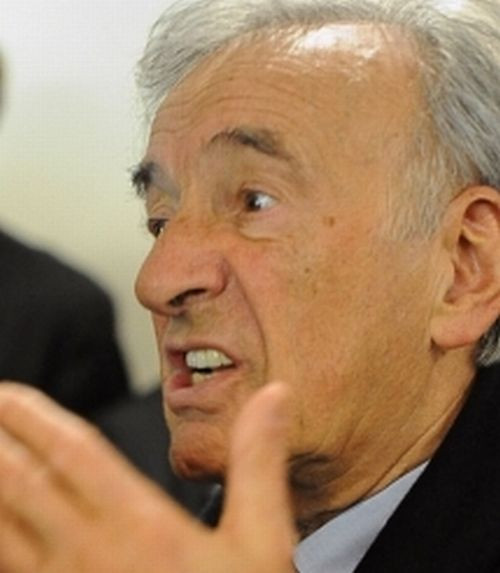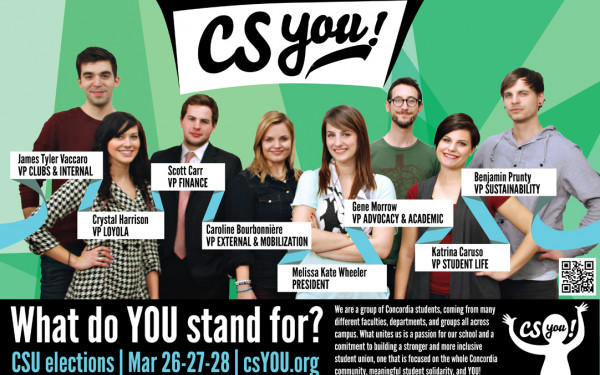Wiesel to Speak at Con U
Author to Speak for Student Union he once called ‘anti-Semitic’
Writer, activist, Noble laureate and Holocaust survivor Elie Wiesel will bring his story to Concordia on Oct. 19.
The Romanian-born Wiesel has published nearly 60 books and is a respected commentator on the subject of racism, violence and the evil of apathy in the face of suffering, which he calls the “greatest of all evils.”
Following the liberation of Auschwitz by Soviet troops in 1945, Wiesel worked as a journalist, novelist and professor of Judaism. In 1954, he broke a self-imposed censure and began to write about his experiences during World War II.
The 865-page Yiddish transcript And the World Remained Silent would become known in English as Night. It is a memoir of his experiences in the Jewish ghettos of Sighet, Romania and later in the death camps of Auschwitz-Birkenau. Night is praised as a hallmark of Holocaust literature.
Wiesel became a respected lecturer and spoke out in support of marginalized groups, including those affected by South African apartheid and the Bosnian genocide in Yugoslavia.
Awarded the Nobel Peace prize in 1986 for his campaigns against racial hatred and institutionalized violence, Wiesel was praised by the Nobel Committee as “a messenger to mankind.”
However, Wiesel is not without his detractors, as many have trouble balancing his stance against institutionalized violence with his support of the state of Israel.
Wiesel is part of Concordia’s recent history as well.
Following the cancellation of a heavily protested appearance by then and current Israeli Prime Minister Benjamin Netanyahu, planned at Concordia University in 2002, Wiesel denounced the Concordia Student Union as “anti-Semitic.”
The protesters denounced Netanyahu as a war criminal. Supporters of the presentation decried the protest as impeding Netanyahu’s free speech.
The Netanyahu affair illustrated the complexity of demographics at Concordia, the variety of perspectives and the often-divisive nature of morality and politics.
Adrien Severyns, the Concordia Student Union’s VP External and Projects said that the Wiesel event is “symbolic” of the CSU’s commitment to move beyond partisan politics.
“Mr. Wiesel is a great humanist and activist,” said Severyns. “He is a survivor who has seen the worst of human nature. This event must not be taken out of context. This is Elie’s story and will not be about the terrible situation in the Middle East.”
The group Solidarity for Palestinian Human Rights Concordia issued a statement denouncing Wiesel’s appearance as a “partisan event,” and that his views “are anti-Palestinian.”
Tomer Shavit, President of Hillel Concordia applauded the decision to host the Wiesel event and sees the event as progress within the student body.
Weisel has been criticized by academics such as Norman Finkelstein and fellow Holocaust survivor Hedy Epstien for his silence on the treatment of the Palestinian people in the Gaza strip.
Epstien has offered to accompany Wiesel to Gaza.
“Remembering is not enough,” she said. “Remembering must have a present, and a future perspective. We cannot deny the suffering of these people.”
Bruce Katz, a Jewish anti-Zionist and president of the group Palestinian and Jewish Unity Montreal describes the situation facing Palestinians in Gaza as, “a parallel to the treatment of the Jews during World War II.” He described Gaza as, “an open air prison camp.”
He insists open dialogue about the Holocaust and its subsequent effects cannot exclude these “inconvenient facts.”
The event will be held in the Hall building room 110. Preregistration is required at www.csu.qc.ca.
This article originally appeared in Volume 31, Issue 09, published October 12, 2010.



__600_375_90_s_c1.jpg)
_600_375_90_s_c1.jpg)
